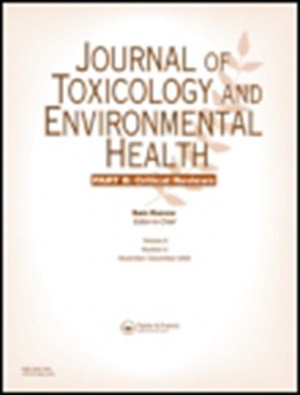飓风、旋风、山洪暴发和重大水文气象事件后有毒和传染物对环境健康的影响
IF 8.1
2区 医学
Q1 ENVIRONMENTAL SCIENCES
Journal of Toxicology and Environmental Health-Part B-Critical Reviews
Pub Date : 2019-08-18
DOI:10.1080/10937404.2019.1654422
引用次数: 29
摘要
由于气候变化,飓风和旋风等极端水文气象事件的频率和强度都在增加,并且往往与沿海、城市化和工业地区的山洪暴发有关。防备和应对措施必须集中于毒理学和传染性危害、对环境健康的潜在影响以及对人类生命的威胁。认识到飓风后洪水的危险是至关重要的。有效的健康管理需要考虑在受化学品泄漏、生物毒素、废物、污水和水传播病原体污染的水中存在有毒物质的可能性和具体风险。尽管在快速检测和测试水中各种化学物质和病原体的能力方面取得了重大进展,但在山洪暴发和飓风引发的洪水背景下,缺乏对毒性测量进行调整的实施。这次审查的目的是强调收集和分析洪水毒性数据的必要性,以了解风险,并使脆弱社区和第一响应者做好准备。建议在救灾期间采用新的和常用的技术,以迅速评估毒性和传染病威胁,并随后采取必要的补救行动。本文章由计算机程序翻译,如有差异,请以英文原文为准。
Environmental health effects attributed to toxic and infectious agents following hurricanes, cyclones, flash floods and major hydrometeorological events
ABSTRACT Extreme hydrometeorological events such as hurricanes and cyclones are increasing in frequency and intensity due to climate change and often associated with flash floods in coastal, urbanized and industrial areas. Preparedness and response measures need to concentrate on toxicological and infectious hazards, the potential impact on environmental health, and threat to human lives. The recognition of the danger of flood water after hurricanes is critical. Effective health management needs to consider the likelihood and specific risks of toxic agents present in waters contaminated by chemical spills, bio-toxins, waste, sewage, and water-borne pathogens. Despite significant progress in the ability to rapidly detect and test water for a wide range of chemicals and pathogens, there has been a lack of implementation to adapt toxicity measurements in the context of flash and hurricane-induced flooding. The aim of this review was to highlight the need to collect and analyze data on toxicity of flood waters to understand the risks and prepare vulnerable communities and first responders. It is proposed that new and routinely used technologies be employed during disaster response to rapidly assess toxicity and infectious disease threats, and subsequently take necessary remedial actions.
求助全文
通过发布文献求助,成功后即可免费获取论文全文。
去求助
来源期刊
CiteScore
13.80
自引率
6.90%
发文量
13
审稿时长
>24 weeks
期刊介绍:
"Journal of Toxicology and Environmental Health: Part B - Critical Reviews" is an academic journal published by Taylor & Francis, focusing on the critical examination of research in the areas of environmental exposure and population health. With an ISSN identifier of 1093-7404, this journal has established itself as a significant source of scholarly content in the field of toxicology and environmental health.
Since its inception, the journal has published over 424 articles that have garnered 35,097 citations, reflecting its impact and relevance in the scientific community. Known for its comprehensive reviews, the journal also goes by the names "Critical Reviews" and "Journal of Toxicology & Environmental Health, Part B, Critical Reviews."
The journal's mission is to provide a platform for in-depth analysis and critical discussion of the latest findings in toxicology, environmental health, and related disciplines. By doing so, it contributes to the advancement of knowledge and understanding of the complex interactions between environmental factors and human health, aiding in the development of strategies to protect and improve public health.

 求助内容:
求助内容: 应助结果提醒方式:
应助结果提醒方式:


